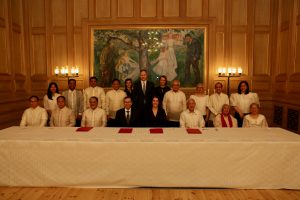Despite the recently announced breakthrough in the peace process involving the government of Philippine President Ferdinand “Bongbong” Marcos Jr. and the communist-led National Democratic Front (NDF), there remain several obstacles that could derail the possible resumption of negotiations in 2024.
When the NDF announced the signing of a joint statement with the Marcos government, it mentioned the detention of its consultants and its designation as a terrorist group. Although it didn’t list the resolution of these issues as a precondition for talks, NDF leaders could demand their inclusion in the agenda of the informal reopening of the talks.
An official of the Marcos government said that the terrorist tag of the NDF can only be lifted once a final peace agreement is signed, but this raises the question as to why the government is talking peace with a group it considers terrorists.
If both parties can resolve these concerns, their next challenge is to develop a framework for the peace talks. The NDF insists on the recognition of previous agreements, which means that the next substantive agenda should be the drafting of a Comprehensive Agreement on Social and Economic Reforms. But Marcos negotiators have a different perspective on this matter. Asked by the media, presidential peace adviser Carlito Galvez Jr. said that the meeting next year will not be a resumption of previous negotiations but the initiation of a new model or framework on how to end the armed communist rebellion that has raged for more than half a century.
In the joint statement, the two parties acknowledged the “deep-rooted socio-economic and political grievances” and “serious socioeconomic and environmental issues” affecting the country. The framework to be decided in the talks should address these problems, which peace advocates consider as the roots of the armed conflict.
The formulation of the framework is crucial to assure supporters of both sides, many of whom remain skeptical about the intentions of the government and the NDF.
NDF supporters are wary that the real aim of the government is mere pacification and total surrender of armed rebels instead of reforms that would bring development and promote empowerment in impoverished rural areas.
For some allies of the Marcos government, resuming talks with the NDF would reverse the gains of the localized amnesty and peacebuilding efforts, which they claim have already succeeded in decimating the ranks of armed rebels. Among those who articulated this point was Vice President Sara Duterte, who warned that renewing negotiations with the NDF was akin to making an “agreement with the devil.”
In an editorial, Philippine Daily Inquirer noted that what the government should ensure is that all agencies will support the peaceful track to ending one of the world’s longest communist insurgencies.
“The President must first persuade and unify his official family to back his quest for elusive peace, reminding them that peace is intrinsically good and infinitely preferable to the vicious cycle of bloody clashes and encounters in the countryside,” the editorial stated.
If news reports quoting the military are accurate, the number of armed rebels has dwindled over the years. But this is not the first time that the government has claimed that it has finally defeated the armed communist movement. Since 1986, successive governments have vowed to crush the armed rebels and have all failed.
Rather than relying on a purely militaristic approach to dealing with the insurgency, the Marcos government should consider the peace process as an opportunity to prove that it is different from its predecessors. Marcos officials were able to persuade the NDF to sign a joint statement that mentioned the need for a peaceful resolution of the armed conflict that would also lead to the “transformation” of the Communist Party of the Philippines and its armed wing, the New People’s Army. This can be interpreted in many ways, which both parties will no doubt elaborate during the formal negotiations.
On the part of the NDF, the peace process can serve as a high-profile platform to present its alternative vision for Philippine society. However, it remains to be seen how it can espouse its radical programs within the framework that it will negotiate with the Marcos government. It has yet to make a stand regarding the demand of some military officials about the signing of a ceasefire agreement if peace talks resume.
The year started without any expectation that there would be a major update in the peace process but the Marcos government and the NDF were able to present a joint statement that offered hope and opened the prospects of peace even if serious obstacles remain in place. Can they deliver another political surprise in 2024 amid the renewed furor of powerful peace spoilers?

































